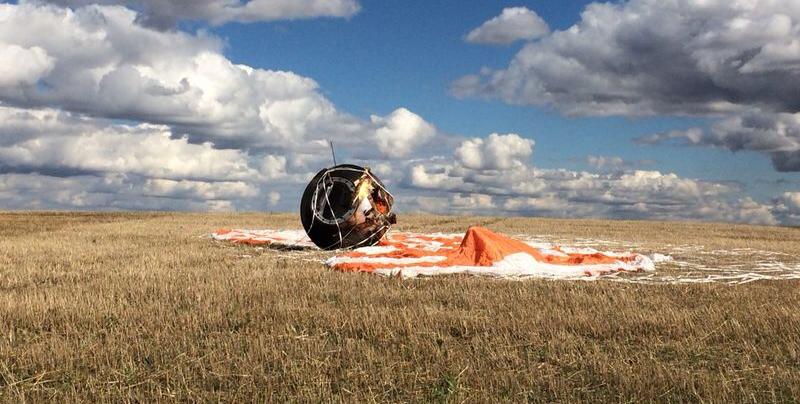
The Foton-M4 descent capsule with famed reptilian cosmonauts, known affectionately as the "sex geckos" (owing to the carnal nature of their space voyage), and also with drosophila fruit flies, seeds of plants, has landed in the Orenburg Region, an official in the press service of Russia's Federal Space Agency (Roscosmos) told ITAR-TASS on Monday.
The touchdown of the Foton spacecraft took place at 09:18 UTC, Roscosmos announced around half an hour after the fact. After landing, the recovery team started rushing to the vehicle. Once reaching the landing site, a field lab was established to perform initial analysis of the scientific payloads at the landing site. Unfortunately, all the five geckos have died.
The touchdown of the Foton spacecraft took place at 09:18 UTC, Roscosmos announced around half an hour after the fact. After landing, the recovery team started rushing to the vehicle. Once reaching the landing site, a field lab was established to perform initial analysis of the scientific payloads at the landing site. Unfortunately, all the five geckos have died.
"We can’t say yet at which stage of Foton’s space flight it happened,” a source at the Academy of Sciences told RIA Novosti on Monday. “At the same time, the fruit flies were in a perfect condition: they produced offspring.” The geckos had been on a two-month mission launched to facilitate research on the effects of zero-gravity on reproductive systems.
The reptiles died at least a week ago as their bodies have already mummified, the Academy’s Medical-Biology Institute said later.
A source “who took part in securing the lander” told Interfax that “as usually happens in such instances, [the space agency] will soon appoint an emergency commission to find out these animals’ cause of death”.
The Foton-M4 satellite was launched on July 19, 2014 from the Baikonur space center in Kazakhstan.
The specimens included geckos, silkworm eggs, dried seeds, fruit flies, and mushrooms. The geckos were part of biology experiments conducted by Russia’s Institute of Medico-Biological Problems on the effects of weightlessness on mating.
The Foton satellite was not equipped to transmit live feeds back to mission control. Were the geckos having sex? Or were they already dead? These questions needs to be answered by Russian scientists in the upcoming weeks.
The specimens included geckos, silkworm eggs, dried seeds, fruit flies, and mushrooms. The geckos were part of biology experiments conducted by Russia’s Institute of Medico-Biological Problems on the effects of weightlessness on mating.
The Foton satellite was not equipped to transmit live feeds back to mission control. Were the geckos having sex? Or were they already dead? These questions needs to be answered by Russian scientists in the upcoming weeks.






Comments